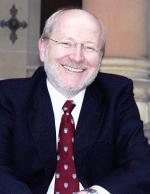McWha's Words
Different, and the same I was recently out of Australia for a few weeks to attend a number of important university functions that have a direct bearing on what it is we do here in Adelaide. These events serve to highlight a crucial issue: that although there are many differences in higher education right across the world, we share many similarities and stand to gain from cooperation. The University of Adelaide is no stranger to cooperation, having many links with Australian and international universities, industry, government and research organisations. One of the cooperative ventures that is extremely important for us, and which we don't talk about as much as we probably should, is the Group of Eight universities in Australia. These are Australia's most prestigious universities and there is no doubt that as a group we are able to create many opportunities for the benefit of each university. During my time overseas, one of these unique benefits was officially launched in Berlin - the Group of Eight Australia Centre Europe. This new centre is effectively a European office for the Group of Eight, acknowledging the strong ties that already exist between our universities and European universities and research organisations. It is aimed at positioning the Group of Eight to build on these relationships and develop new partnerships in research, scholarship and education. That's good news for the University of Adelaide, as it will help us to further promote our research and educational opportunities, provide exchange programs for staff and students, and perhaps develop alumni networks in the European Union that will maintain a close association with Adelaide over the years. This theme of global cooperation was continued - albeit in a different way - in Cairo at last month's conference of the International Association of University Presidents (IAUP). Importantly, this was the first time in the IAUP's 40-year existence that a Middle Eastern country had hosted the association's annual meeting. The overall mission for the IAUP is to involve members in the world's crucial issues: to reduce economic and social differences between countries and people, to reduce inequality between races and sexes, to improve competence and knowledge globally, to increase mutual understanding, tolerance and respect between peoples, and to contribute to a more peaceful global society. With everything going on in the Gulf Region and across the world today, these key messages were extremely important at the meeting, which included a discussion on the Israel-Palestine conflict and building international peace through education. It was a fitting way to celebrate the IAUP's 40 years, and I was proud to be a part of it. Some of the benefits to be gained from such activities may well take many years to realise, but we are hopeful that education - and cooperation among universities - will bring benefits to all peoples in all corners of the globe, no matter how different we may be. PROFESSOR JAMES A. McWHA
Vice-Chancellor
|





